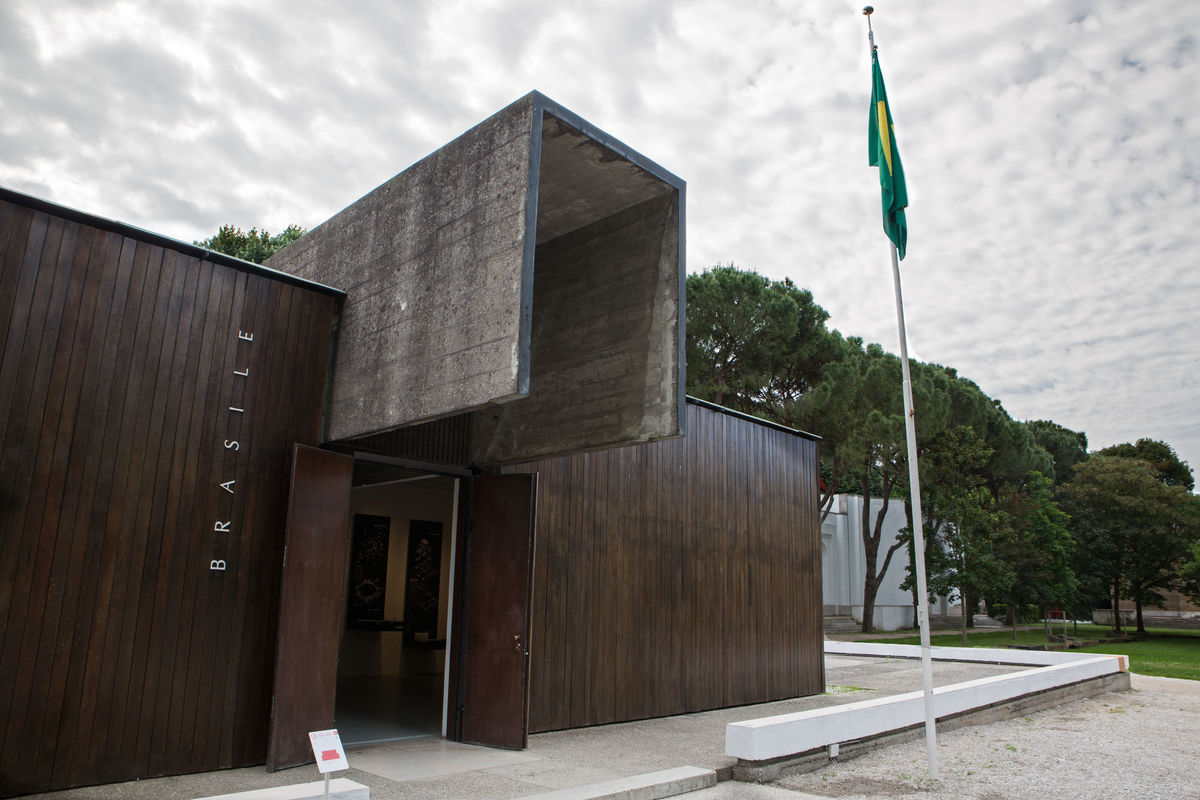The Fundação Bienal de São Paulo, in partnership with the Ministry of Foreign Affairs and the Ministry of Culture, announces Brazil’s national participation for Biennale Arte 2024: Ka’a Pûera: nós somos pássaros que andam [Ka’a Pûera: we are walking birds], by Glicéria Tupinambá and guests, curated by Arissana Pataxó, Denilson Baniwa and Gustavo Caboco Wapichana. The exhibition will also see the Brazil Pavilion renamed as the Hãhãwpuá Pavilion.
Winner of the 2023 PIPA Prize, the artist Glicéria Tupinambá, also known as Célia Tupinambá, is leading Brazil’s delegation to the 60th Venice Biennale, alongside her community and other guests who will be announced in the near future, sharing the wealth of Tupinambá culture and its journey of resistance and resurgence.
Ka’a Pûera: we are walking birds
The title Ka’a Pûera alludes to two interconnected interpretations. Firstly, it refers to the ancient forests cleared by the Tupinambá for agriculture, which later regenerate, revealing the potential for resurgence. In addition, the capoeira is also known by the Tupinambá as a small bird that lives in dense forests, disguising itself in the environment. Ka’a Pûera: we are walking birds addresses issues of marginalization, deterritorialization and the violation of territorial rights, calling for reflection on resistance and the shared essence of humanity, birds, memory and nature.
Glicéria Tupinambá was imprisoned in 2010, and is living the history of the Tupinambá indigenous people, who were foreigners for centuries in their own territory, as their leaders were criminalized, persecuted, and disappeared, while part of their cultural goods were seized. Foreigners in their Hãhãw (ancestral territory), the Tupinambá were considered extinct until 2001, when the Brazilian State finally recognised that not only had the Tupinambá never been exterminated, but were actively fighting to reclaim their territory and part of their culture that had been taken away by colonization. Ka’a Pûera: we are walking birds celebrates the resilience and memory of Brazil’s indigenous communities in the context of the Venice Biennale’s global theme.
“In ancient Tupi, the language of the Tupinambá, Ka’a Puera are ancient forests that were cut down to make fields. After the harvest, this space is left to rest and a place with lower vegetation emerges. At first glance, this space may seem infertile and inhospitable, but it is in the capoeira that a great variety of medicinal plants can be found. And with the soil recovering, it may soon be a new field for the community’s sustenance or a new forest. Where there is apparently no life, there is the possibility of resurgence. However, capoeira is also known by the Tupinambá people as a small bird that lives in dense forests, its brown, orange and gray feathers camouflaging the bird on the forest floor,” explain the curators. With this double meaning, the exhibition thus proposes “that we remember those who are on the margins, deterritorialised, invisibilised, imprisoned, and whose territorial rights have been violated, but who call us to resistance, believing that we are human-birds-memory-nature, because there is always the possibility of resurgence and resistance”.
For José Olympio da Veiga Pereira, president of the Fundação Bienal de São Paulo, the new selection process for Brazil’s national participation at Venice is cause for celebration: “Since the last Venice Architecture Biennale, we have been perfecting our approach to choosing projects. The success that brought us our first Golden Lion fills us with confidence that this project will also be a triumph. By having a committee select proposals submitted by various curators, we have the opportunity to broaden dialogues and strengthen the inclusion of voices from all over our country in this global showcase of contemporary art that is the Venice Biennale. This time, the pavilion will be imbued with the vision of curators and artists from indigenous communities, who bring an urgent perspective to the world, linked to the global theme of the edition.”
The Hãhãwpuá Pavilion
The Hãhãwpuá Pavilion symbolizes Brazil as an indigenous territory, with “Hãhãw” meaning “land” in the Pataxohã language. The name “Hãhãwpuá” is used by the Pataxó people to refer to the territory that, after colonization, became known as Brazil, but which has had many other names.
Exploring the theme Foreigners Everywhere from the 60th International Art Exhibition – La Biennale di Venezia.
The participation of the Hãhãwpuá Pavilion in the 60th International Art Exhibition – La Biennale di Venezia is aligned with the theme Foreigners Everywhere. The exhibition highlights the memory of the forest, capoeira and camouflaged birds as a metaphor for the struggles of Brazil’s indigenous peoples and their strategies for resurgence and resistance. The artist Glicéria Tupinambá, a representative of her people, brings the perspective of Foreigners Everywhere to the reality of Brazil’s indigenous peoples, whose history entails centuries of marginalization in their own territory.
Service
Brazil Pavilion at the 60th International Art Exhibition – La Biennale di Venezia
Commissioner: José Olympio da Veiga Pereira, President of the Fundação Bienal de São Paulo
Curators: Arissana Pataxó, Denilson Baniwa and Gustavo Caboco Wapichana
Participants: Glicéria Tupinambá and guests
Venue: Hãhãwpuá Pavilion (Brazilian Pavilion)
Address: Giardini Napoleonici di Castello, Padiglione Brasile, 30122, Venice, Italy
Date: April 20th to November 24th, 2024
Preview for press and media professionals: 17-19 April 2024
